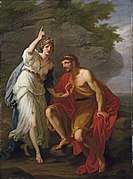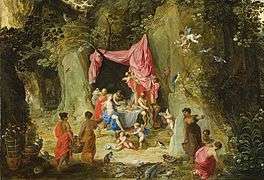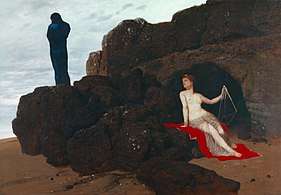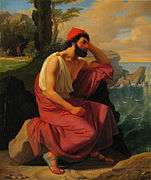Calypso (mythology)
Calypso (/kəˈlɪpsoʊ/; Greek: Καλυψώ, translit. Kalypsō) was a nymph in Greek mythology, who lived on the island of Ogygia, where, according to the Odyssey, she detained Odysseus for seven years.
| Calypso | |
|---|---|
 Detail from Calypso receiving Telemachus and Mentor in the Grotto by William Hamilton | |
| Abode | Ogygia |
| Personal information | |
| Parents | Atlas, Pleione |
| Children | By some accounts Latinus, by others Nausithous and Nausinous |
Etymology
The etymology of Calypso's name is from καλύπτω (kalyptō), meaning "to cover", "to conceal", "to hide", or "to deceive".[1] According to Etymologicum Magnum, her name means "concealing the knowledge" (καλύπτουσα το διανοούμενον, kalýptousa to dianooúmenon), which – combined with the Homeric epithet δολόεσσα (dolóessa, meaning "subtle" or "wily") – justifies the eremetic character of Calypso and her island. The word καλύπτω is derived from Proto-Indo-European *ḱel-, making it cognate with the English word "Hell".
Genealogy
Calypso is generally said to be the daughter of the Titan Atlas[2] and Pleione.[3] Hesiod, and the Homeric Hymn to Demeter, mention either a different Calypso or possibly the same Calypso as one of the Oceanid daughters of Tethys and Oceanus.[4] Apollodorus includes the name Calypso in his list of Nereids, the daughters of Nereus and Doris.[5]
Mythology
In Homer's Odyssey, Calypso attempts to keep the fabled Greek hero Odysseus on her island to make him her immortal husband. According to Homer, Calypso kept Odysseus prisoner at Ogygia for seven years.[6] Calypso enchants Odysseus with her singing as she moves to and from, weaving on her loom with a golden shuttle. Odysseus soon comes to wish for circumstances to change.
Odysseus can no longer bear being separated from his wife, Penelope, and wants to go to Calypso to tell her. His patron goddess Athena asks Zeus to order the release of Odysseus from the island, and Zeus orders the messenger Hermes to tell Calypso to set Odysseus free, for it was not his destiny to live with her forever. She angrily comments on how the gods hate goddesses having affairs with mortals, but eventually concedes, sending Odysseus on his way after providing him with wine, bread, and the materials for a raft.
Homer does not mention any children by Calypso. By some accounts, which come after the Odyssey, Calypso bore Odysseus a son, Latinus,[7] though Circe is usually given as Latinus' mother.[8] In other accounts, Calypso bore Odysseus two children: Nausithous and Nausinous.[9] The story of Odysseus and Calypso has some close resemblances to the interactions between Gilgamesh and Siduri in the Epic of Gilgamesh in that "the lone female plies the inconsolable hero-wanderer with drink and sends him off to a place beyond the sea reserved for a special class of honoured people" and "to prepare for the voyage he has to cut down and trim timbers."[10]
In Literature
In her 1836 poem ![]()
Philosophy
Philosophers have written about the meaning of Calypso in the Ancient Greek world. Ryan Patrick Hanley commented on the interpretation of Calypso in Les Aventures de Télémaque written by Fénelon. Hanley says that the story of Calypso illustrates the link between Eros and pride.[11] Theodore Adorno and Max Horkheimer brought attention to the combination of power over fate and the sensibility of "bourgeois housewives" in the depiction of Calypso.[12]
Gallery
 Calypso, blonde-haired goddess by Jan Styka (20th century)
Calypso, blonde-haired goddess by Jan Styka (20th century) Calypsoby George Hitchcock (about 1906)
Calypsoby George Hitchcock (about 1906) The Goddess Calypso rescues Ulysses Cornelius van Poelenburgh (1630)
The Goddess Calypso rescues Ulysses Cornelius van Poelenburgh (1630) Calypso calling heaven and earth to witness her sincere affection to Ulysses by Angelica Kauffman (18th-century)
Calypso calling heaven and earth to witness her sincere affection to Ulysses by Angelica Kauffman (18th-century) Calypso receiving Telemachus and Mentor in the Grotto by William Hamilton (18th century)
Calypso receiving Telemachus and Mentor in the Grotto by William Hamilton (18th century) Mercury ordering Calypso to release Odysseus by Gerard de Lairesse (1676-1682)
Mercury ordering Calypso to release Odysseus by Gerard de Lairesse (1676-1682) Odysseus as guest at the nymph Calypso by Hendrick van Balen (circa 1616)
Odysseus as guest at the nymph Calypso by Hendrick van Balen (circa 1616)- Hermes Ordering Calypso to Release Odysseus by Gerard de Lairesse (circa 1670)
 Odysseus und Kalypso by Arnold Böcklin (1883)
Odysseus und Kalypso by Arnold Böcklin (1883) Calypso by Henri Lehmann (1869)
Calypso by Henri Lehmann (1869) Calypso's Isle by Herbert James Draper (1897)
Calypso's Isle by Herbert James Draper (1897) Ulysses on Calypso's island by Ditlev Blunck (1830)
Ulysses on Calypso's island by Ditlev Blunck (1830) Hermes bei Calypso und Odysseus by Hubert Maurer
Hermes bei Calypso und Odysseus by Hubert Maurer Hermes orders Calypso to release Odysseus by John Flaxman (1810)
Hermes orders Calypso to release Odysseus by John Flaxman (1810)
References
- Entry καλύπτω at LSJ
- Homer, Odyssey, 1.14, 1.51–54, 7.245; Apollodorus, E.7.24. She is sometimes referred to as Atlantis (Ατλαντίς), which means the daughter of Atlas, see the entry Ατλαντίς in Liddell & Scott, and also Hesiod, Theogony 938.
- Hyginus. Fabulae, Preface
- Hesiod, Theogony 359; Homeric Hymn 2.422. According to Caldwell, p. 49 n. 359, the Hesiod Oceanid is "probably not" the same; see also West 1966, p. 267 359. καὶ ἱμερόεσσα Καλυψώ; Hard, p. 41.
- Apollodorus, 1.2.7
- Homer, Odyssey 7.259
- Apollodorus, E.7.24
- Hesiod, Theogony 1011
- See Hesiod, Theogony 1019, Sir James George Frazer in his notes to Apollodorus, E.7.24, says that these verses "are probably not by Hesiod but have been interpolated by a later poet of the Roman era in order to provide the Latins with a distinguished Greek ancestry".
- Dalley, S. (1989) "Myths from Mesopotamia" Oxford University Press, Oxford, NY.
- Schliesser, Eric. Ten Neglected Classics of Philosophy. Oxford University Press, 2017. ISBN 9780199928927 – via Google Books.
- Horkheimer, Max; Adorno, Theodore. Dialectic of Enlightenment. Stanford University Press. ISBN 9780804736336 – via Google Books.
Sources
- Apollodorus, Apollodorus, The Library, with an English Translation by Sir James George Frazer, F.B.A., F.R.S. in 2 Volumes. Cambridge, Massachusetts, Harvard University Press; London, William Heinemann Ltd. 1921. Online version at the Perseus Digital Library.
- Caldwell, Richard, Hesiod's Theogony, Focus Publishing/R. Pullins Company (June 1, 1987). ISBN 978-0-941051-00-2.
- Grimal, Pierre, The Dictionary of Classical Mythology, Wiley-Blackwell, 1996, ISBN 978-0-631-20102-1. "Calypso" p. 86
- Hard, Robin, The Routledge Handbook of Greek Mythology: Based on H.J. Rose's "Handbook of Greek Mythology", Psychology Press, 2004, ISBN 9780415186360.
- Hesiod, Theogony, in The Homeric Hymns and Homerica with an English Translation by Hugh G. Evelyn-White, Cambridge, Massachusetts., Harvard University Press; London, William Heinemann Ltd. 1914. Online version at the Perseus Digital Library.
- Homer, The Odyssey with an English Translation by A.T. Murray, PH.D. in two volumes. Cambridge, Massachusetts., Harvard University Press; London, William Heinemann, Ltd. 1919. Online version at the Perseus Digital Library.
- Homeric Hymn to Demeter (2), in The Homeric Hymns and Homerica with an English Translation by Hugh G. Evelyn-White, Cambridge, Massachusetts., Harvard University Press; London, William Heinemann Ltd. 1914. Online version at the Perseus Digital Library.
- Hyginus, Gaius Julius, Fabulae in Apollodorus' Library and Hyginus' Fabuae: Two Handbooks of Greek Mythology, Translated, with Introductions by R. Scott Smith and Stephen M. Trzaskoma, Hackett Publishing Company, 2007. ISBN 978-0-87220-821-6.
- Smith, William; Dictionary of Greek and Roman Biography and Mythology, London (1873). "Calypso"
- West, M. L. (1966), Hesiod: Theogony, Oxford University Press. ISBN 0-19-814169-6.
External links
- Chisholm, Hugh, ed. (1911). . Encyclopædia Britannica (11th ed.). Cambridge University Press.